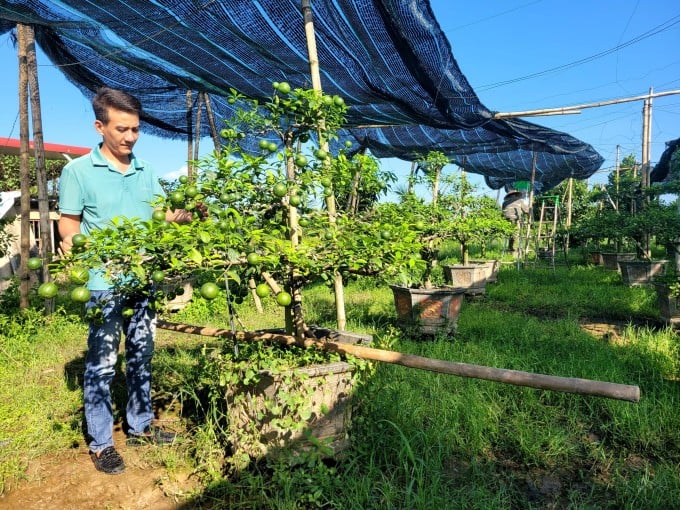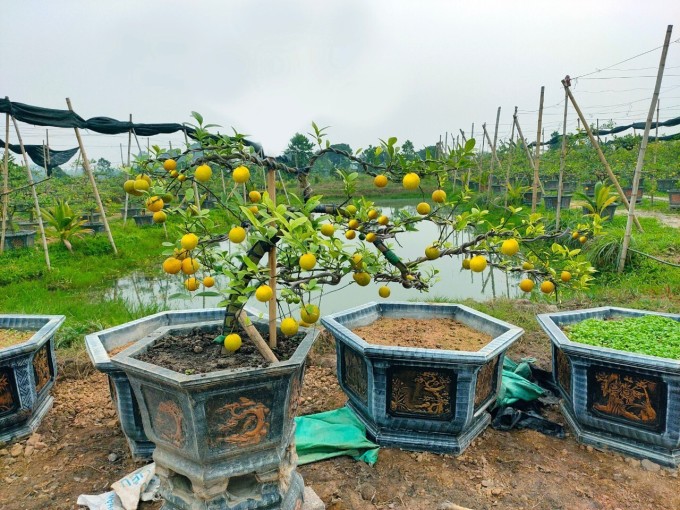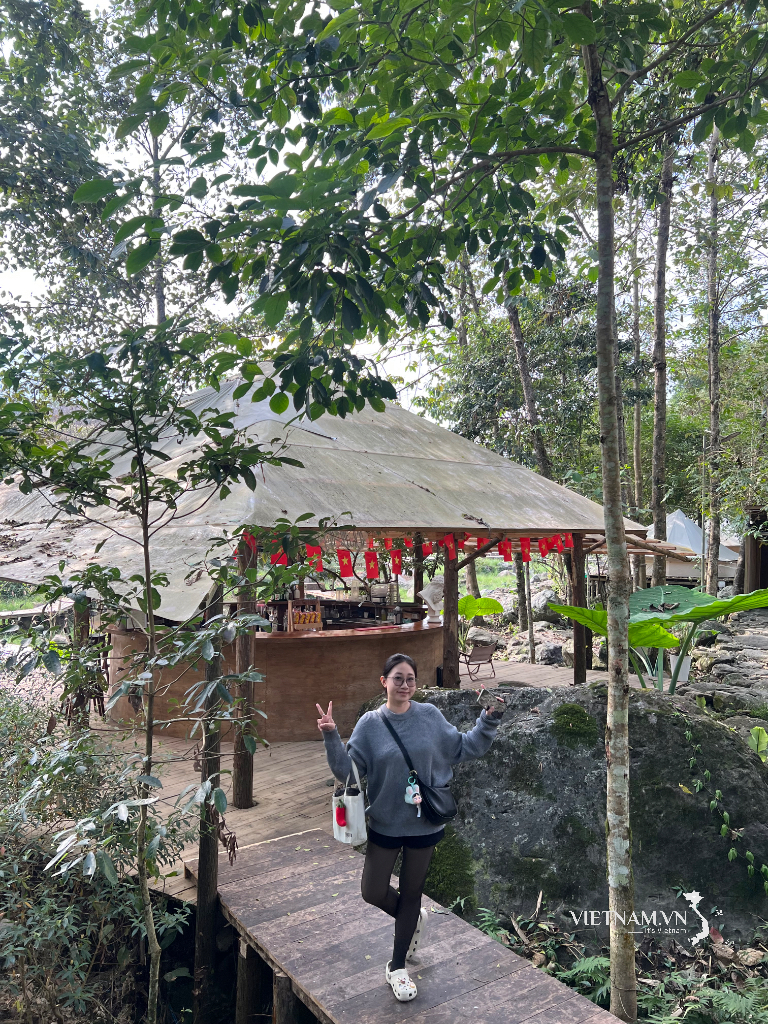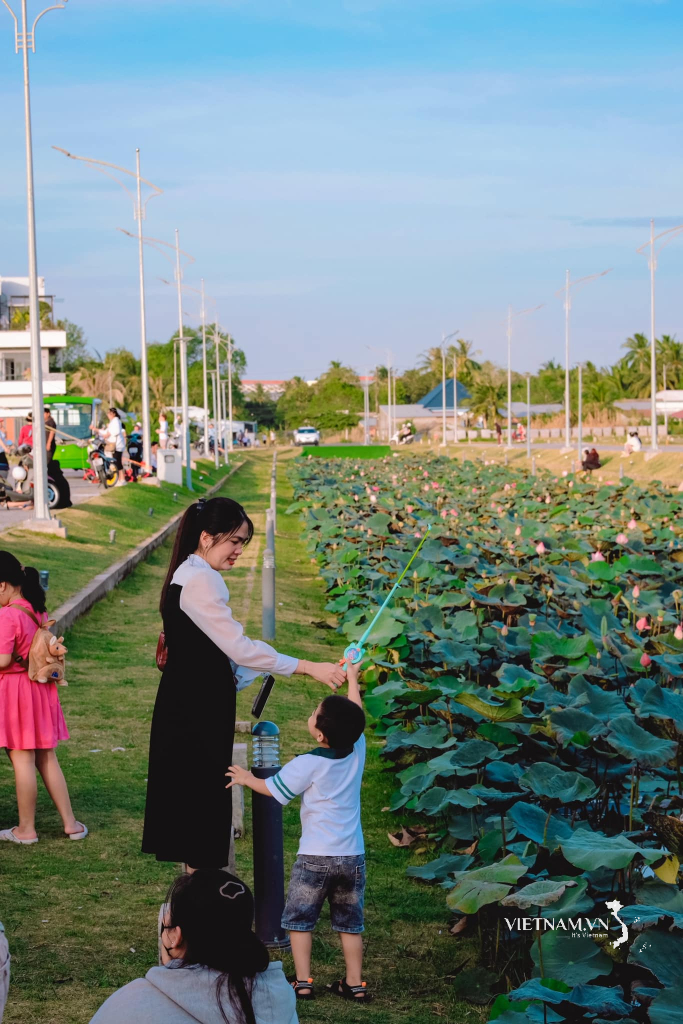Hai Phong – After 5 years of dedication, Tuan Anh, 36, has successfully grafted the four-season lemon variety onto a pomelo rootstock, shaping it into a bonsai tree, and plans to sell it during Tet (Lunar New Year) 2024.
Nguyen Tuan Anh's four-season lemon orchard is nestled among abandoned rice fields in the Ngoi field, Thuan Thien commune, Kien Thuy district. Inside the orchard, a group of workers water the trees, weed, and prune the branches, shaping the lemon trees whose fruit is ripe but still green.
Before starting his business with four-season lemon trees, Tuan Anh spent seven years working as a tour guide. While visiting many rural areas, he noticed that motorbike mechanics lacked professional tools, resulting in lengthy repairs. Having a passion for mechanics, he tinkered with the area and created a tire removal machine. The product sold well, leading him to quit tourism and switch to mechanics.
Having settled into his new career, in 2018, he unexpectedly told his family he was investing heavily in agriculture . "My whole family was surprised because my mechanical engineering job was providing a good income, and returning to farming was hard work and involved many risks. Actually, I just wanted to utilize the abandoned farmland in my hometown," Tuan Anh explained. His hometown's land was low-lying, infested with rats, and rice cultivation was ineffective, so it had been left fallow for many years.

Mr. Tuan Anh and his bonsai lemon trees with still green fruit. Photo: Le Tan.
After days of researching agricultural models and seedlings, Tuan Anh decided to choose the four-season lemon tree. "Not only is it good for eating fruit, but in feng shui, the lemon tree also helps eliminate negative energy, bringing positive energy and good luck to the homeowner, so it can be planted as an ornamental plant," he said.
He hired people to renovate three acres of his family's rice fields, then went to Hung Yen to import 5,000 saplings of the four-season lime tree. This variety originates from the Americas, bears fruit year-round, and has a sour, juicy taste. When ripe, the fruit is bright yellow, making it suitable for ornamental purposes.
The orchard owner divides the seedlings into two types. 3,000 trees are planted for harvesting fruit and leaves, and for producing seedlings later. The rest are grafted onto pomelo rootstock to create healthier trees that are easier to shape into bonsai, which can be sold at a higher price during Tet (Lunar New Year).
To ensure his lemon tree has both ripe yellow and green fruit, as well as flowers and leaves for the Lunar New Year celebration, Mr. Tuan Anh has to carefully plan the pruning and leaf removal. The first harvest of fruit occurs in February of the lunar calendar and ripens to a golden yellow after eight months. Mid-year is when the bonsai lemon tree produces its second harvest, with the fruit still green when sold. After the Lunar New Year, the tree only needs regular watering and fertilization with organic fertilizer to continue growing and producing fruit year-round.
Tuan Anh only uses bio-fertilizers, well-rotted manure, and soaked soybeans instead of chemical nitrogen fertilizers. An automated irrigation system is designed to water each tree individually, ensuring the lemon trees are healthy and beautiful. "This method increases costs and labor, but the trees are durable and healthy, allowing growers to enjoy the fruit and leaves without worry," he explains.
After two years of cultivating the saplings, he transferred the lemon trees to pots and began shaping them. Lemon branches are fragile and thorny. He and his family tried to shape them themselves but failed, ruining hundreds of saplings, so they had to hire professional help, accepting the high cost. Each year, the team from Nam Dinh comes twice to shape and adjust the trees, each time for two months, at a cost of 700,000 VND per person per day.

By Tet (Vietnamese New Year), the bonsai lemon tree bears bright yellow ripe fruit. Photo: Le Tan
It takes 4-5 years to grow bonsai lemon trees before they can be sold, and all of Tuan Anh's savings from his mechanics job, along with several billion dong borrowed from the bank, have been invested in his lemon orchard. "Taking care of the orchard is hard work, and it hasn't brought in any money yet. At least 10 times I wanted to give up. Luckily, my family and friends have constantly encouraged and supported me," he shared. Currently, he still makes tire removal machines to earn income and cover the costs of growing lemons.
Currently, the lemon orchard has expanded to 10 acres with 2,000 potted bonsai trees, ready for the Lunar New Year season. The owner is building a promotional channel on YouTube and other social media platforms to let customers know about this new product.
The leaders of Thuan Thien commune People's Committee assessed that growing bonsai lemon trees is a new and unique model in Kien Thuy district, with great development potential. This model utilizes abandoned land, so it has received attention and support from all levels of government in the form of policy loans.
Le Tan
Source link















































































































Comment (0)